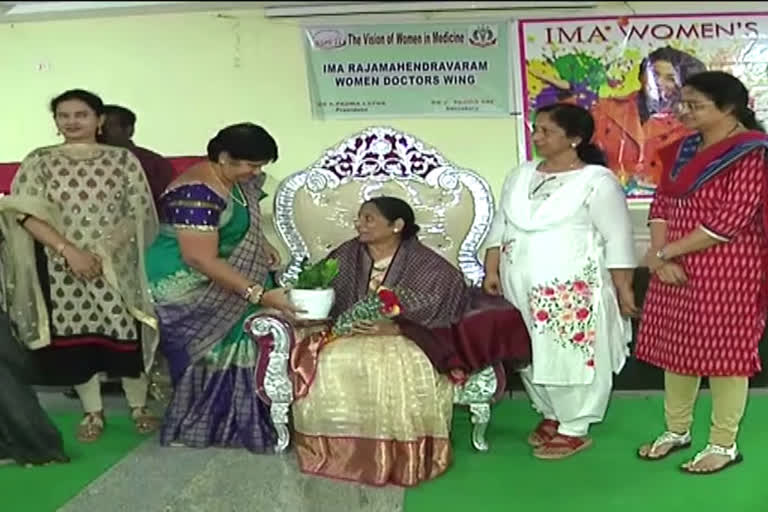ETV Bharat / city
మహిళా వైద్యుల.. 'వుమెన్స్ డే' - doctors
అంతర్జాతీయ మహిళా దినోత్సవాన్ని పురస్కరించుకుని రాజమహేంద్రవరంలో ఐఎంఏ మహిళా విభాగం ఆధ్వర్యంలో వేడుకలు చేశారు. ఆరోగ్యం, పరిశుభ్రత నినాదంతో వేడక నిర్వహించారు.

రాజమహేంద్రవరం
By
Published : Mar 3, 2019, 8:37 PM IST
అంతర్జాతీయ మహిళా దినోత్సవాన్ని పురస్కరించుకుని రాజమహేంద్రవరంలో ఐఎంఏ మహిళా విభాగం ఆధ్వర్యంలో వేడుకలు నిర్వహించారు. నగరంలోని ఇండియన్ మెడికల్ అసోసియేషన్ హాలులో మహిళా వైద్యులు పెద్దసంఖ్యలో సందడి చేశారు. ఆరోగ్యం, పరిశుభ్రత నినాదంతో ఈ వేడక చేశామని నిర్వాహకులు తెలిపారు.40 ఏళ్లుగా వైద్యరంగంలో సేవలందిస్తున్న వనితలను సన్మానించారు. స్త్రీ ఆరోగ్యం పట్ల తీసుకోవాల్సిన జాగ్రత్తలపై సదస్సులు నిర్వహించాలని పిలుపునిచ్చారు. యోగా, వ్యక్తిత్వ వికాసం, కరాటే తదితర అంశాలపై అవగాహన కల్పించారు.
అంతర్జాతీయ మహిళా దినోత్సవాన్ని పురస్కరించుకుని రాజమహేంద్రవరంలో ఐఎంఏ మహిళా విభాగం ఆధ్వర్యంలో వేడుకలు నిర్వహించారు. నగరంలోని ఇండియన్ మెడికల్ అసోసియేషన్ హాలులో మహిళా వైద్యులు పెద్దసంఖ్యలో సందడి చేశారు. ఆరోగ్యం, పరిశుభ్రత నినాదంతో ఈ వేడక చేశామని నిర్వాహకులు తెలిపారు.40 ఏళ్లుగా వైద్యరంగంలో సేవలందిస్తున్న వనితలను సన్మానించారు. స్త్రీ ఆరోగ్యం పట్ల తీసుకోవాల్సిన జాగ్రత్తలపై సదస్సులు నిర్వహించాలని పిలుపునిచ్చారు. యోగా, వ్యక్తిత్వ వికాసం, కరాటే తదితర అంశాలపై అవగాహన కల్పించారు. SHOTLIST:
RESTRICTION SUMMARY: AP CLIENTS ONLY
ASSOCIATED PRESS
Rio de Janeiro, 22 February 2019
1. Various of Henrique Matos, a Brazilian boy with autism playing video games
2. Various of Matos standing in his bedroom with his mother Rosinea Fagundes looking for his samba T-shirt
3. Close of Matos' T-shirt on the bed
4. Matos putting on T-shirt and asking in (Portuguese): "Nice?"
ASSOCIATED PRESS
Rio de Janeiro, 27 February 2019
5. SOUNDBITE (Portuguese) Rosinea Fagundes, Henrique Matos' mother:
"I'm proud because he has limitations, but not in music. It comes from him. If you put a (musical) instrument next to him, he will take a look, will see how it works and will start playing it. So, it belongs to him, he was born with it, I'm very proud."
6. Various of Matos playing the tambourine
7. SOUNDBITE (Portuguese) Henrique Matos, member of the Portela Children Samba School:
"Well, I began (to like) Samba when I was a teenager. The first Samba I liked to listen to is 'Em cima da hora - Os sertoes', the most played Samba."
ASSOCIATED PRESS
Rio de Janeiro, 22 February 2019
++NIGHT SHOTS++
8. People gathered outside of Samba school
9. Matos and his Fagundes arriving for rehearsal at Samba school
10. Various of Matos and members of his band playing music
11. Wide of rehearsal
12. Youth with disability making a heart shaped figure with his fingers
13. Close of boy dancing
14. Celso de Andrade, director of the Portela Children Samba School standing
15. SOUNDBITE (Portuguese) Celso de Andrade, director of the Portela Children Samba School:
"The culture is, and has to be, inclusive. Inclusive not just of those who are different, who are special, the deaf, the blind, those down syndrome, those with autism - the culture has to be inclusive of the population whatever it is: black, white, Jewish, Catholic, Umbanda (Afro-Brazilian religion), Candomble (Afro-Brazilian religion), Pentecostal. It is culture, and it has to be inclusive."
16. Various of children dancing and music playing during rehearsal
17. Pan right of rehearsal
18. Children from the Portela Samba School walking during rehearsal
STORYLINE:
BRAZIL CARNIVAL OPENS UP TO SPECIAL NEEDS CHILDREN
Rosinea Fagundes couldn't believe her ears when her 17-year-old autistic son, Henrique, decided he would try to become a composer for one of Rio de Janeiro's most famous and traditional samba schools.
With no history of family interest in samba or music, Fagundes says "I'm proud because he has limitations, but not in music,"
Since he was a small child, Henrique had been watching samba parades on television, and four years ago he began playing in the drumline in Portela's children's school.
Last year, Henrique wrote a song, "Samba of Inclusion," and brought it to leaders of Portela.
They liked it so much they invited Henrique to play drums with the main school.
Some 16 samba schools have children's groups that parade during the world-famous bash that kicks off this weekend.
However, traditionally those children's schools have had the estimated 800 kids with disabilities parade in groups by themselves.
"The culture is, and has to be, inclusive," Celso de Andrade, director of Portela's children school said.
For the first time this year, when Portela's children's group parades on Tuesday, special needs children will be dancing and singing alongside the other children.
It follows similar decisions in recent years by at least three other major schools.
While small changes, advocates for special needs children see signs of increasing inclusion in Latin America's largest nation.
In 2015, Brazil's Congress passed a law that mandated conventional public schools accept children with special needs.
For Henrique, samba is also a mode of communicating.
While speaking is clearly difficult for him, his pounding of the drum comes both effortlessly and meticulously.
"He was born with it," said Henrique's mother speaking from her home in Rio deJaneoiro.
"I'm very proud," she added.
===========================================================
Clients are reminded:
(i) to check the terms of their licence agreements for use of content outside news programming and that further advice and assistance can be obtained from the AP Archive on: Tel +44 (0) 20 7482 7482 Email: info@aparchive.com
(ii) they should check with the applicable collecting society in their Territory regarding the clearance of any sound recording or performance included within the AP Television News service
(iii) they have editorial responsibility for the use of all and any content included within the AP Television News service and for libel, privacy, compliance and third party rights applicable to their Territory.



